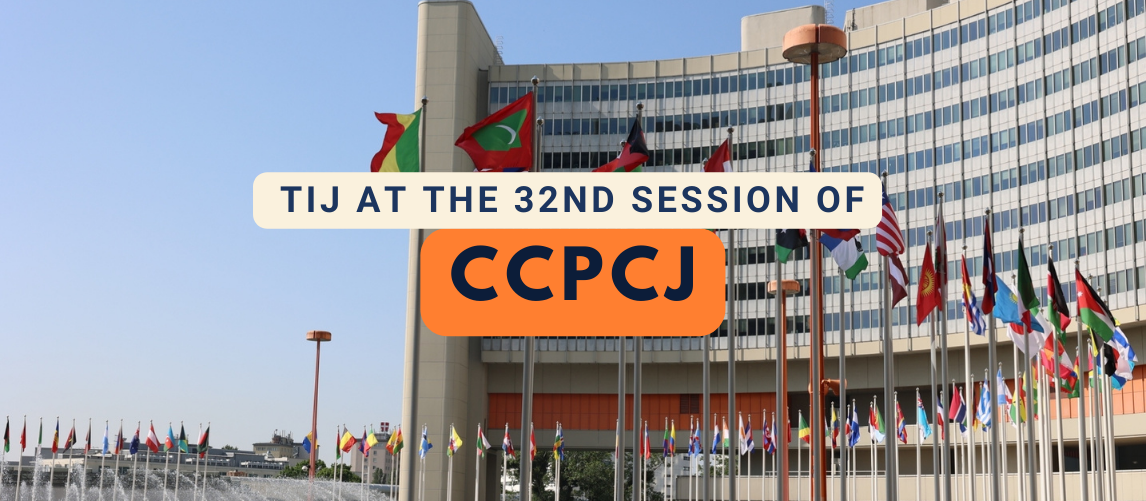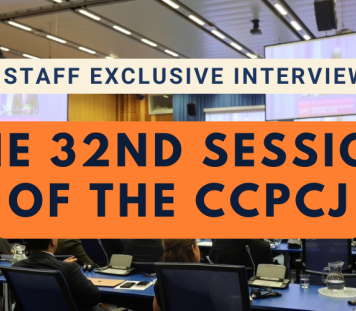Every year, the Commission on Crime Prevention and Criminal Justice (CCPCJ) is convened as a gathering of policy-makers, practitioners, academics, and intergovernmental organizations to discuss emerging trends in the field of crime prevention and criminal justice.
For this year, the 32nd session of the CCPCJ was held between 22th – 26th May 2023 in Vienna, Austria. The Thailand Institute of Justice (TIJ), as member of the United Nations Crime Prevention and Criminal Justice Network (UN-PNI), joined with the Government of Thailand to present policies and practical directions on crime prevention and criminal justice at an international level.

Today, TIJ newsletter has an opportunity to interview Kittipoom Neamhom, Director of the Office of the External Relations and Policy Coordination, Thailand Institute of Justice, about the role of TIJ in the CCPCJ this year.
"The important roles of TIJ this year can be divided into two parts. Firstly, as a coordinator of the PNI Network. Secondly, as a collaborative organization with the Thai government, TIJ has been actively advocating the international standards especially the treatment of women prisoners and alternative measures to incarceration for women offenders, known as the Bangkok Rules." Kittipoom said and further added that this year's conference is significant as we have a chance to meet PNI friends and colleagues at the CCPCJ in-person over the past few years of COVID-19. Since 2021 when the TIJ taking role as a PNI coordinator, we have been organizing the meeting online throughout years. Therefore, this year marks the first time we have been fulfilled in the role of PNI Coordinator in person setting.
_230606p7.jpg)
TIJ in collaboration with the National Institute of Justice (NIJ), conducted a PNI Workshop under the theme "Enhancing the Functioning of the Criminal Justice System to Ensure Access to Justice and to Realize A Safe and Secure Society." The PNI Workshop focused on three main issues; identification and empowerment of victims, legal safeguards and protection in the criminal process, and realizing justice and a safe and secure society.
_230606p4.jpg)
Also, TIJ collaborated with the United Nations Office on Drugs and Crime (UNODC) organizing a side event titled "Expanding the Promise of the Bangkok Rules: Towards Gender Responsive and Inclusive Justice for All." The event included panelists such as Ms. Ghada Fathi Waly, Executive Director of UNODC; Professor Dr. Kittipong Kittiyarak, Advisor to TIJ; Ms. Tomoko Akane, a Judge of the International Criminal Court; Mr. Taro Morinaga, the Director of the United Nations Asia and Far East Institute for the Prevention of Crime and Treatment of Offenders (UNAFEI); and Ms. Olivia Rope, the Director of Penal Reform International. The event was moderated by Dr. Phiset Sa-ardyen, Executive Director of TIJ.
The side event emphasized the importance of the implementation of Bangkok Rules, particularly the inspirational role played by the advocacy of HRH Princess Bajrakitiyabha, and what must be done to achieve and expand the promise of the Bangkok Rules across different regions globally. Productive discussions were had on the need for a comprehensive strategy to achieve the promise set down by the Bangkok Rules.
_230629_1.jpg)
_230629_7.jpg)
Kittipoom said that another highlight of the event is the exhibition entitled "From Dark to Light: the Bangkok Rules and the Future of Women Prisoners," showcasing innovative practices that lead to positive change in the lives of women prisoners and promising attempts to shift public perception from punitive measures towards empathetic views. An example from Thailand, the Ruean Pathamarong Museum in Chiang Mai in Northern Thailand, was presented via virtual reality (VR) technology. This museum reflects the journey of women through correctional systems and their rehabilitation and reintegration into society post-release. An interactive map, created in collaboration with Penal Reform International, was also shown at the exhibition.
Moreover, Kittipoom stated that although the Government of Thailand and TIJ did not present any resolution this year, there have been development through a collaboration with the Government of Thailand related to the resolution on "Integrating Sport into Youth Crime Prevention and Criminal Justice" which were presented at the 28th session of the CCPCJ in 2019 and the 14th Crime Congress in 2020. The resolution emphasized the importance of sports as a sustainable development tool and highlighted the role of sports in promoting and rehabilitating delinquent youth and at-risk children by integrating sports training with life skills development. It aims to reintegrate them into society and provide them with a normal and happy life.
This year, TIJ has been invited to participate in a side event organized by the International Olympic Committee (IOC) and the UNODC under the theme "Team up against Crime: Strengthening the Role and Contribution of Sports in the Context of Multisectoral Partnership for Youth Crime Prevention." This event showcases the progress made in implementing the resolution at an international level. It includes the presentation on the UNODC's Youth Crime Prevention through Sport (YCP) plans and the development in various countries, including the "Bounce Be Good" Sport Club in Thailand.
Before we parted, Kittipoom expressed his hope that in the future CCPCJ, TIJ, as the UN-PNI and PNI Coordinator, will play a stronger role in fostering cooperation among the PNI network and representatives from government, private sector, and civil society. This can be achieved through the active dissemination of knowledge and insights. The PNI Newsletters and online media platforms such as Instagram and LinkedIn can been created as to disseminate and exchange knowledge and practices of the PNI widely. A way forward for the PNI is to collaborate more on the issues of the common interest such as on restorative justice and innovation for justice.
_230629_4.jpg)
"Raising the visibility and recognition of the PNI network at the international level will contribute to strengthening the network and fostering closer collaboration, ultimately leading to greater societal benefits," concluded Kittipoom.
Other notable activity involved TIJ
_230606p2.jpg)
A side event titled "Towards People-Centered Justice: Advancing Collaboration with Data in Southeast Asia," hosted by TIJ and the World Justice Project (WJP). The event brought together experts on trailblazing projects in Southeast Asia that is enhancing people-centered justice through data analysis and collaboration. The event discussed models of data collection, current findings of justice needs and its impact, as well as the importance of collaboration in turning evidence into practical actions through various perspectives from a global organization like the World Justice Project, to domestic projects like Access to Justice Index from Indonesia and Justice Needs Survey in Thailand.
TIJ also participated in several side events organized by the Member States and intergovernmental organizations including a side event on the topic "A Forgotten Population: the Treatment of Prisoners in Challenging Times," high-level meeing by the Group of Friends of the Nelson Mandela Rules; a side event on the topic "Team up against Crime: Strengthening the Role and Contribution of Sports in the Context of Multisectoral Partnership for Youth Crime Prevention" organized by the International Olympic Committee (IOC) and the UNODC; and a side event organized on the topic "PNI Efforts to Reduce Reoffending through Technical Assistance" organized by fellow of the PNI Members UNAFEI; among others.
The CCPCJ has been held annually since 2006 to facilitate the exchange of knowledge and policies in crime prevention and criminal justice at the international level. The CCPCJ consists of 40 member states and holds two regular sessions per year. Participants include policymakers, practitioners, government officials, experts, and representatives from civil society. The CCPCJ also serves as a preparatory meeting for the presentation of international standards on criminal justice field at the UN Crime Congress, which takes place every five years. The most recent Congress was held in 2021 in Tokyo, Japan.




